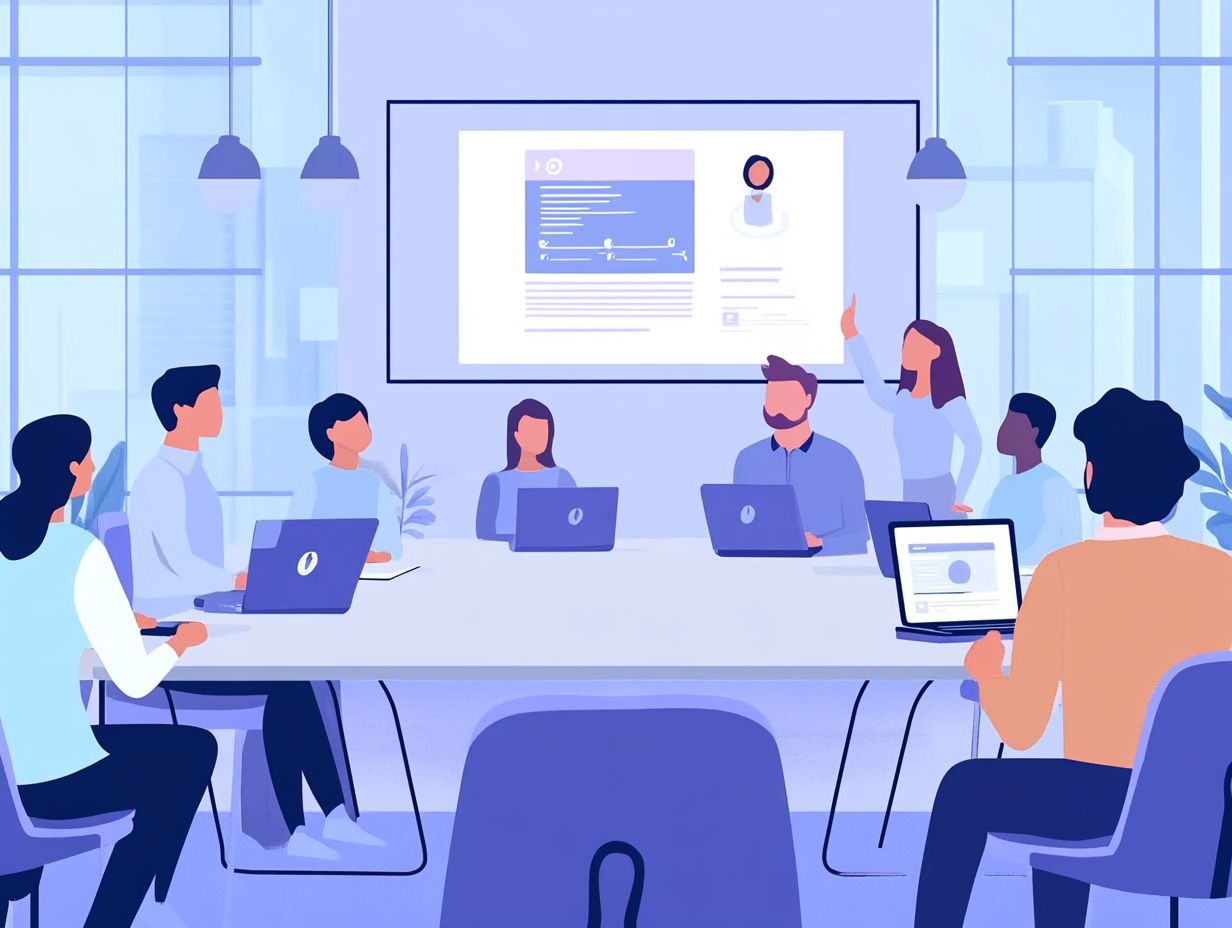The Future of Employee Onboarding: Trends to Watch
Employee onboarding goes beyond a simple orientation; it is a pivotal process that shapes the experiences of new hires and significantly influences the overall success of a company.
This article delves into the current landscape of onboarding, shedding light on prevalent practices and the challenges organizations encounter. It also explores the latest trends, such as technology integration, personalization, and the growing adoption of virtual onboarding.
By grasping these elements, you will uncover how effective onboarding can yield substantial benefits for both employees and employers. We invite you to explore best practices and tips for successfully implementing these trends.
Contents
- Key Takeaways:
- Current State of Employee Onboarding
- The Impact of Employee Onboarding on Company Success
- Trends in Employee Onboarding
- How to Implement New Onboarding Trends
- Frequently Asked Questions
- What is the future of employee onboarding?
- What are some current trends in employee onboarding?
- How will technology impact the future of employee onboarding?
- Why is it important for companies to stay updated on employee onboarding trends?
- How can companies ensure a smooth onboarding process for new employees?
- What role do company culture and employee engagement play in onboarding?
Key Takeaways:

- Technology revolutionizes onboarding, offering seamless and personalized experiences that enhance engagement.
- Virtual onboarding is booming, making it easier to welcome remote workers effectively.
- Strong onboarding boosts productivity, retention, and overall job satisfaction.
What is Employee Onboarding?
Employee onboarding is the process you embark on to integrate new hires into your organization. This process enhances their engagement and retention by providing a structured introduction to your workplace culture, policies, and expectations. It is not just beneficial for new employees; it is also vital for your organization to ensure a seamless integration that contributes to long-term growth.
Effective onboarding plays a key role in shaping a positive employee experience, as it sets the tone for the journey ahead. You can adopt various onboarding processes, such as orientation sessions, mentorship programs, and hands-on training, all aimed at fostering a welcoming environment.
Investing time and resources in a thoughtfully structured onboarding program can significantly boost employee retention rates and engagement levels, transforming new hires into committed team members. When employees feel supported and informed from day one, they are far more likely to contribute positively to your organization s objectives, leading to a mutually beneficial relationship.
Current State of Employee Onboarding
The landscape of employee onboarding is undergoing a significant transformation, particularly with the surge in remote work. It is essential for you to change your onboarding programs to effectively cater to the needs of new hires in this digital era.
Embracing these changes will not only streamline the onboarding process but also enhance the overall experience for your new team members.
Common Practices and Challenges
In your approach to employee onboarding, consider incorporating structured onboarding checklists, personalized training modules, and the assignment of onboarding buddies. These elements can significantly enhance new hires’ adaptation to your workplace culture while proactively addressing any onboarding challenges they may encounter.
Mentorship programs can be invaluable. Pairing new employees with seasoned colleagues fosters deeper relationships and provides essential guidance during their transition. Introducing gamification into onboarding tasks can boost engagement, transforming the onboarding process into an interactive and enjoyable journey. Employees can earn rewards and recognition as they hit training milestones, making the experience feel more rewarding.
Organizations often face challenges in sustaining engagement, particularly in today s rapidly evolving work environment, where remote and hybrid models are increasingly prevalent. It is vital to ensure that employees feel connected and supported throughout this process, as the connections they build during onboarding can have a lasting impact on their overall job satisfaction and commitment to the company.
The Impact of Employee Onboarding on Company Success

The influence of employee onboarding on your company’s success is profound. An effective onboarding experience is intricately linked to higher employee retention rates, enhanced engagement levels, and significant organizational growth.
Prioritizing a thoughtful onboarding process sets the stage for long-term success and a thriving workplace culture.
Trends in Employee Onboarding

Emerging trends in employee onboarding indicate a notable shift toward technology-driven methods. You’ll find that digital tools are increasingly being used to craft a more engaging and efficient onboarding experience.
There s a growing reliance on AI solutions to not only automate but also personalize the onboarding process for new hires. This ensures they feel welcomed and equipped right from the start.
Technology Integration
Technology integration in employee onboarding has opened the door to a world of smooth experiences for you. It harnesses various digital tools and onboarding software to streamline processes.
This transformative approach not only simplifies administrative tasks; it creates a more engaging environment that welcomes you into the fold. By utilizing tools like Applicant Tracking Systems (ATS) software that helps employers manage the hiring process and digital onboarding platforms, you can automate paperwork and keep track of your progress.
Learning Management Systems (LMS) like TalentLMS or Moodle take things a step further. They offer tailored training modules that accommodate different learning styles.
These systems guarantee that you receive essential skills and knowledge in an interactive manner. This makes the onboarding process both enjoyable and beneficial. Such integration enhances efficiency and lays a strong foundation for your successful career within the organization.
Personalization and Customization
Personalization and customization in employee onboarding are becoming vital for you. This allows your organization to tailor experiences and training materials to meet the unique needs and preferences of each new hire.
This approach fosters a deeper connection to the workplace culture, making the onboarding process more meaningful. It will help new hires feel welcome and valued, significantly enhancing their engagement levels from day one.
By incorporating customized training modules that align with each individual s role and career aspirations, you can ensure that every employee is not just informed but genuinely inspired.
Offering a variety of onboarding materials such as interactive guides, personalized checklists, and role-specific resources can help newcomers seamlessly integrate into the team. To effectively implement these tailored strategies, gather data through pre-employment surveys or initial interviews. This insight will enable you to design a more relevant onboarding plan that resonates with each new hire s learning style and professional goals.
Virtual Onboarding
Virtual onboarding has become an essential strategy for organizations adapting to remote work. It allows you, as a new hire, to engage in onboarding activities through video conferencing and various digital platforms. This ensures a seamless transition into your role.
This exciting approach not only bridges the physical distance but also opens up exciting avenues for engagement. To enhance your experience, many organizations are integrating gamified training modules and virtual team-building exercises. Don’t miss out on the chance to connect with your colleagues in a relaxed atmosphere!
By utilizing collaborative tools like online whiteboards and breakout rooms, real-time support and communication come to life. However, the challenge lies in keeping you engaged and preventing feelings of isolation. Striking a thoughtful balance between structured activities and informal check-ins is key to creating a welcoming virtual environment that truly fosters connection.
Benefits of Effective Onboarding
The benefits of effective onboarding go far beyond just an initial orientation. They lead to enhanced engagement and higher retention rates. Additionally, a richer overall employee experience contributes to the success of the organization.
Did you know that you re 58% more likely to stay for three years if you have a great onboarding experience? A structured onboarding process builds loyalty and accelerates your integration into teams, enabling you to collaborate effectively right from the start.
Organizations with strong onboarding programs see a remarkable 70% increase in employee productivity within the first few months. By thoughtfully introducing you to your role, the company culture, and team dynamics, businesses can create an environment that maximizes your job satisfaction while significantly cutting down on turnover costs.
How to Implement New Onboarding Trends
Implementing new onboarding trends requires a strategic approach. Focus on creating new programs that utilize emerging technologies. This includes integrating the latest tools and actively seeking feedback to continuously improve the onboarding experience for new hires.
Best Practices and Tips
Employing best practices in employee onboarding can significantly enhance your onboarding experience. This ensures that new hires are fully equipped with the resources and support they need to excel in their roles.
By implementing a structured onboarding checklist, you can streamline the process and ensure that all essential topics and training sessions are thoroughly covered. Providing accessible resources, such as training videos and guides, allows new employees to adjust smoothly to their responsibilities.
Fostering a welcoming environment through team-building activities promotes camaraderie and encourages collaboration among colleagues. Continuous feedback is equally vital; scheduled check-ins enable new hires to voice concerns and receive guidance, ultimately cultivating a more engaged and productive workforce.
Frequently Asked Questions

What is the future of employee onboarding?
Employee onboarding is changing quickly. It now focuses on making the integration of new hires easier and more effective for both the employer and employee.
What are some current trends in employee onboarding?
Current trends in employee onboarding include the use of technology such as virtual onboarding, gamification, and personalized experiences. There is also a focus on creating a strong company culture and building relationships between new hires and their colleagues.
How will technology impact the future of employee onboarding?
Technology will significantly influence the future of onboarding. With the rise of virtual onboarding, artificial intelligence, and automation, the process will become more efficient and personalized. Remote onboarding will also be easier, allowing companies to onboard employees from anywhere in the world.
Why is it important for companies to stay updated on employee onboarding trends?
Staying updated on onboarding trends is essential for attracting and retaining top talent. By incorporating innovative methods, companies can create a positive and memorable experience for new employees, which boosts their engagement and productivity in the long run.
How can companies ensure a smooth onboarding process for new employees?
To ensure a smooth onboarding process, companies should have a structured plan in place. Providing necessary resources and support, along with regular communication, helps address questions or concerns. Incorporating technology and personalized experiences can also enhance engagement and efficiency.
What onboarding methods have you found most effective? Feel free to reach out for more information on implementing these strategies!
What role do company culture and employee engagement play in onboarding?
Company culture and employee engagement are vital in onboarding. A strong culture helps new employees feel connected and motivated.
By creating a welcoming and supportive environment, companies can boost employee retention and satisfaction. Are you ready to create a culture that keeps your employees excited and engaged from day one?






